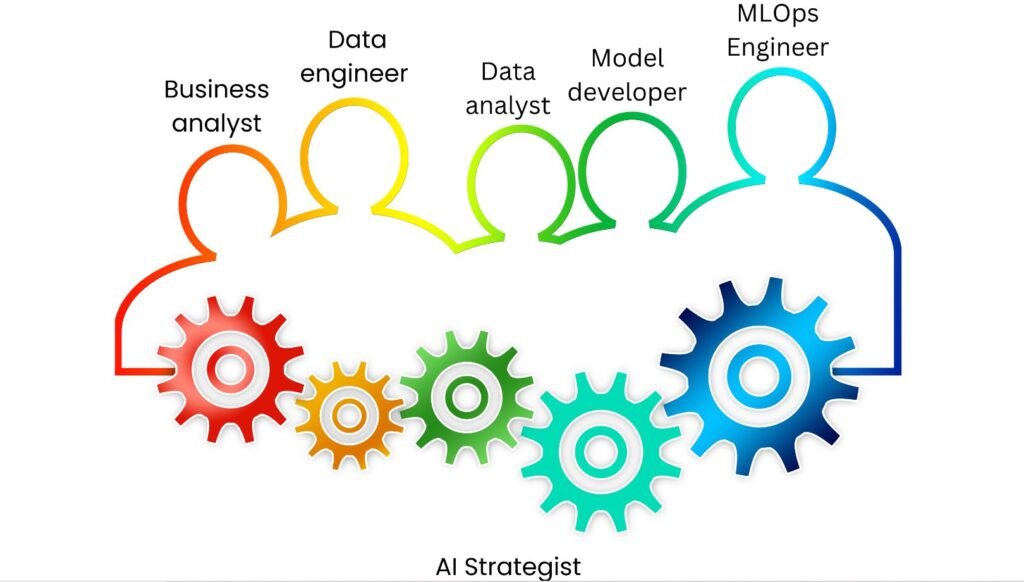If you’ve ever heard the term AI strategist tossed around and thought, “What do they actually do?”, you’re in the right place.
Artificial Intelligence (AI) is basically everywhere these days. And behind all this technology, especially in businesses, there’s often an AI strategist making sure that these tools actually serve a purpose and bring value.
An AI strategist is kind of like a bridge between the tech world and the business world. They figure out how AI can be used not just for the sake of having cool tech, but to actually help a company grow, solve problems, and stay ahead of the competition.
Sounds interesting, right?
What Does an AI Strategist Actually Do?

What does an AI strategist actually do? Well, it’s a bit of everything, but all tied around the goal of using AI in ways that make a business better. They don’t just throw around fancy terms like “machine learning” or “data modeling” for fun (okay, maybe a little for fun), but they also develop clear, actionable plans to help companies use AI in smart, efficient ways.
Picture this: A company wants to use AI to improve how they interact with customers. Maybe they want to personalize recommendations or automate their customer service.
The AI strategist is the one who steps in, assesses the company’s goals, and figures out exactly how AI can get the job done. They create a strategic roadmap that outlines everything from selecting the right AI tools to making sure it all fits with the company’s long-term goals.
Here’s what that might look like:
1. Strategic Planning
This is where the AI strategist puts on their business hat. They talk to the company’s key decision-makers and figure out where AI can help the most.
An AI strategist creates a plan that connects AI to business needs like: Improving customer service, making the supply chain run smoother, or identifying sales opportunities, amongst other things.
2. Tech Assessment
AI changes fast. One minute, you’re talking about chatbots, and the next, you’re hearing about AI that writes poetry.
AI strategists stay on top of these developments, figuring out which technologies are worth exploring for the business. They sift through all the AI options out there to see which ones will actually work for the company.
3. Risk Management
AI can be a double-edged sword. It’s powerful, but it also comes with risks like data privacy issues or ethical concerns.
The AI strategist makes sure these risks are handled early on, creating plans that address potential problems before they become full-blown crises.
4. Implementation
Once the plan is in place, it’s time to get things rolling. The AI strategist works with different teams to make sure the AI systems are smoothly integrated into the company’s operations.
They don’t just say “good luck” and walk away – they oversee the whole process, making sure the technology works as intended.
5. Performance Monitoring
Even after the AI system is up and running, the AI strategist’s job isn’t done. They keep an eye on how well everything is working by tracking performance through KPIs (key performance indicators). If something’s off, they adjust the system to make sure it delivers on its promise.
6. Ethics and Responsibility
AI comes with some heavy ethical questions—think about bias in algorithms or privacy concerns.
AI strategists make sure that any AI the company uses follows ethical guidelines, and they keep the technology aligned with legal and moral standards. No one wants to make headlines for the wrong reasons!
What Skills Do You Need to Be an AI Strategist?

Being an AI strategist is a unique role because it requires a mix of tech smarts and business know-how. You need to understand how AI works, but also how it fits into a bigger business picture. Here’s what it takes:
- AI Expertise: You need to know your stuff when it comes to artificial intelligence – everything from machine learning and natural language processing to computer vision. But more importantly, you need to know how these tools can actually help a business grow or solve specific problems.
- Business Sense: Understanding AI is only half the battle. You also need to have a good grasp of how businesses operate, including market trends and industry challenges. This helps you align AI initiatives with real-world goals.
- Data Analytics: Data is the bread and butter of AI. Analyzing that data and understanding how it can be turned into actionable insights is key. AI strategists use this information to inform decisions and refine their strategies.
- Communication Skills: Not everyone in a company will understand AI jargon. As an AI strategist, you need to explain complex ideas in simple terms and build a bridge between the tech team and the decision-makers.
- Adaptability: AI is constantly evolving, which means you have to stay on your toes. New developments pop up all the time, so AI strategists need to be flexible and ready to pivot when the landscape changes.
How Much Does an AI Strategist Make?

Let’s talk money – because if you’re thinking of becoming an AI strategist, you’re probably wondering what the paycheck looks like.
The good news? AI strategists are in demand, and with that comes some pretty impressive salaries. In the U.S., they typically earn between $90,000 and $150,000 a year, depending on experience and location.
For those with specialized expertise or who work in high-demand industries, the pay can be even higher. Plus, many companies sweeten the deal with extras like bonuses, stock options, or even health benefits. As AI continues to grow in importance, those salary ranges are only expected to increase.
How AI Strategists Use Data
One of the coolest parts of being an AI strategist is working with data. Data is everywhere. There’s data on customer behavior, sales numbers, social media interactions, amongst others – and AI strategists use this data to drive business decisions.
Here’s how they do it:
- Data Prep: First, they clean up the data and make sure it’s ready to use. Think of this like prepping ingredients before you cook.
- Exploratory Data Analysis (EDA): This is where they dig into the data, using charts and graphs to figure out hidden patterns and trends.
- Machine Learning Models: Once they’ve explored the data, they put it to work by feeding it into machine learning algorithms that can predict outcomes or suggest solutions.
- NLP and Text Analysis: If the data is in text form (like emails or customer reviews), they’ll use natural language processing to make sense of it and uncover insights.
By the time they’re done, the data has been transformed into actionable insights that help the company make better decisions and stay competitive.
Optimizing Business Processes with AI
One of the main reasons companies hire an AI strategist is to streamline their operations and improve productivity. AI can do some incredible things when it comes to making a business run smoother.
AI strategists use tools like machine learning to predict things like equipment failures or customer demand, and they help companies automate repetitive tasks so employees can focus on more important work. It’s all about efficiency – helping businesses cut costs and increase productivity.
Wrapping It All Up
Being an AI strategist is a unique and exciting role that blends technology with strategy. It’s all about using AI to help businesses solve problems, make better decisions, and stay ahead of the competition.
It’s clear that the roles of AI strategists is becoming more important as AI continues to change the way we work and live.
